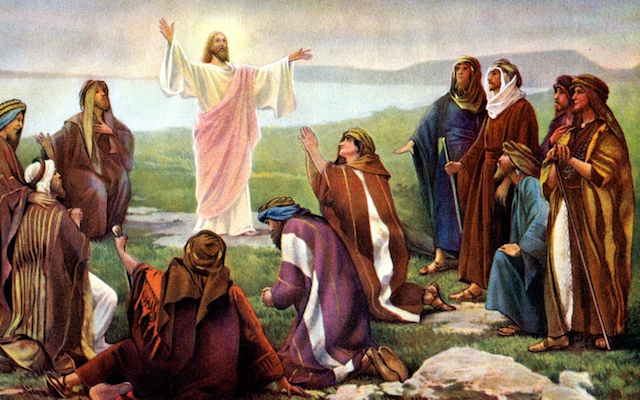Jesus’ teaching and ministry began with a small group of unlearned, ordinary men and then turned into a movement that rapidly spread and is still spreading across the world. After rising from the dead, Jesus handed over the ministry to the disciples He invested in.
I have written before about how Jesus developed His disciples during His earthly ministry (link), but today I want to focus on how Jesus led His disciples after His resurrection from the dead. Those days immediately following the resurrection further teach us about the character of Jesus and also how to effectively develop and deploy others. Here are six ways Jesus led His disciples after His resurrection:
1. He descended.
Thomas insisted the testimony of the other disciples was not enough for him to believe that Jesus was alive; he needed to see “the mark of the nails.” Jesus met Thomas where he was and showed Thomas His hands and side (John 20:27). Jesus still, in His grace, meets us where we are.
2. He involved.
One day Jesus appeared to His disciples while they were fishing, and He involved them in another miracle. He invited them to cast their nets to the right side of the boat, where they caught so many fish that they could not pull the nets in (John 21:6). Jesus still involves us. Jesus does not need us, but because He loves us, He chooses to include us.
3. He served.
On this same day, when the disciples came ashore, Jesus had breakfast ready for them. Rather than demanding they serve Him, the King who conquered the grave made breakfast for His disciples (John 21:9). The essence of the Christian faith is not that we serve Him but that He has served us.
4. He restored.
After feeding His disciples, Jesus pursued Peter to restore Him. Peter had denied he even knew Jesus. Instead of ostracizing, Jesus pursued him with a question: Peter do you love Me (John 21:15)? Thankfully, Jesus still pursues His people.
5. He challenged.
As Peter declared his devotion and love for Jesus, Jesus challenged him to “feed My sheep” (John 21:17). Jesus challenged Peter to commit his life to teaching and shepherding people. And Jesus challenges us to use this one life He has given us for His glory and the advance of His kingdom.
6. He empowered.
Jesus empowered His disciples to “go…and make disciples of all nations” (Matthew 28:19) and reminded them that He had the authority to do so. Jesus shared responsibility for the mission with His disciples. He empowered them to teach people to observe everything He commanded. The commission He gave His disciples is our commission too.
There are, of course, implications for leaders.
How Jesus led His disciples and how He leads us should impact how we lead others. We should descend to others and meet them where they are. We should involve others and include them. We should serve others instead of demanding they serve us. We should restore others because we love them. We should challenge others to give their lives to what matters most. And we should empower those we lead to lead others. Because Jesus is alive and lives within us, we can lead others the way He has led us.






